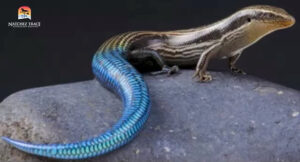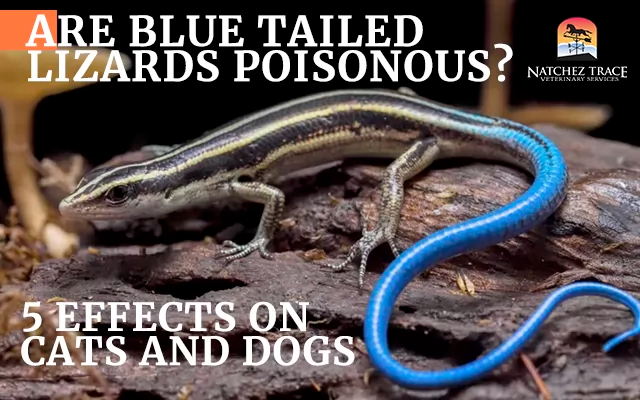 Imagine your curious feline friend roaming around the garden, eyes fixed on a darting creature with a captivating blue tail. As a vigilant pet parent, it’s natural to wonder, “Are blue tailed lizards poisonous to cats?”
Imagine your curious feline friend roaming around the garden, eyes fixed on a darting creature with a captivating blue tail. As a vigilant pet parent, it’s natural to wonder, “Are blue tailed lizards poisonous to cats?”
This article will quench your curiosity and shed light on the potential dangers these vibrant reptiles might pose to our beloved furry companions. We’ll explore whether blue tailed lizards are poisonous to cats and even touch upon their impact on our canine pals.
Are Blue Tailed Lizards Poisonous to Cats?
The short answer: not exactly. Blue tailed lizards, despite their striking appearance, are not inherently poisonous to cats. In other words, they won’t inject a deadly toxin like some venomous snakes might. However, there’s more to this story that you should be aware of.
 The Bright Blue Deception: That electric blue tail isn’t just for show; it serves a clever purpose. When threatened, blue tailed lizards might shed their tails as a distraction, leaving the wiggling tail behind to confuse predators. While this tail doesn’t contain venom, it could potentially cause mild stomach upset if ingested by your curious kitty.
The Bright Blue Deception: That electric blue tail isn’t just for show; it serves a clever purpose. When threatened, blue tailed lizards might shed their tails as a distraction, leaving the wiggling tail behind to confuse predators. While this tail doesn’t contain venom, it could potentially cause mild stomach upset if ingested by your curious kitty.
- Curiosity and Consequences: Cats are natural hunters, driven by an insatiable curiosity to explore and sometimes even taste the unknown. If your feline friend decides to have a nibble on a blue tailed lizard, the consequences might be discomforting but usually not severe. In most cases, mild symptoms like drooling, vomiting, or diarrhea might occur as the digestive system reacts to the unusual meal.
- A Word on Dogs: Now, what about our canine companions? The good news is that blue tailed lizards are generally not poisonous to dogs either. Just like with cats, ingesting a lizard might lead to minor tummy troubles in dogs. However, due to differences in their behaviors and preferences, dogs are less likely to find these skittish reptiles enticing.
While blue tailed lizards are not truly poisonous to cats or dogs, their vibrant appearance and curious behavior might pique the interest of your pets. Remember that prevention is key, and a watchful eye on your furry friends during outdoor adventures can go a long way in ensuring their safety.
So, the next time your cat gazes at that captivating blue tail, you can rest assured that while not dangerous, a lizard-laden nibble might still lead to an upset tummy.
Identifying Blue-Tailed Lizard Poisoning: 5 Symptoms in Pets
Interactions with blue tailed lizards can lead to specific symptoms in pets that have ingested them. It’s essential for pet owners to recognize these signs to ensure their furry companions receive appropriate care. Here are five symptoms of blue tailed lizard poisoning in pets:
 Gastrointestinal Distress: One of the most common symptoms is gastrointestinal upset. Pets might experience vomiting, diarrhea, or excessive drooling. These reactions stem from the digestive system’s response to an unfamiliar meal. In this case, Kan Essentials Harmonize The Stomach can provide relief to digestive distress.
Gastrointestinal Distress: One of the most common symptoms is gastrointestinal upset. Pets might experience vomiting, diarrhea, or excessive drooling. These reactions stem from the digestive system’s response to an unfamiliar meal. In this case, Kan Essentials Harmonize The Stomach can provide relief to digestive distress.- Lethargy and Weakness: If a pet has consumed a blue tailed lizard, they might exhibit signs of lethargy and weakness. This could be due to the body’s effort to process the foreign substance.
- Loss of Appetite: Blue tailed lizard ingestion might lead to a temporary loss of appetite in pets. If your pet suddenly becomes disinterested in their food, it’s worth considering their recent interactions.
- Behavioral Changes:
 Pets could display changes in behavior after encountering a blue tailed lizard. They might appear restless, agitated, or exhibit discomfort. Observing unusual behavior is crucial in assessing their well-being.
Pets could display changes in behavior after encountering a blue tailed lizard. They might appear restless, agitated, or exhibit discomfort. Observing unusual behavior is crucial in assessing their well-being. - Abdominal Discomfort: Pets experiencing blue tailed lizard poisoning might exhibit signs of abdominal discomfort. This could manifest as restlessness, pacing, or vocalization due to the discomfort they’re feeling.
If you notice any of these symptoms in your pet after a blue tailed lizard encounter, it’s advisable to consult with Dr. Smith promptly. While the lizards themselves are not poisonous, the reactions they trigger in pets can still necessitate medical attention to ensure a swift recovery.
In Conclusion,
As pet owners, our responsibility is to ensure the safety and well-being of our furry companions. In the quest to unravel the mystery behind blue tailed lizards and their potential effects on cats and dogs, we’ve discovered that while these reptiles aren’t truly poisonous, they can still trigger reactions in our pets.
 Prevention, education, and timely care stand as our allies in this endeavor. Supervising outdoor activities and fostering responsible interactions between our pets and these creatures can help mitigate potential risks.
Prevention, education, and timely care stand as our allies in this endeavor. Supervising outdoor activities and fostering responsible interactions between our pets and these creatures can help mitigate potential risks.
So, to the question “Are blue tailed lizards poisonous?” the answer is no. However, the journey of responsible pet ownership entails more than a simple “yes” or “no.” It’s about staying informed, acting with care, and promoting the well-being of our beloved companions.
By balancing our pets’ curiosity with their safety, we can create a harmonious environment where both pets and blue-tailed lizards can coexist without harm.







